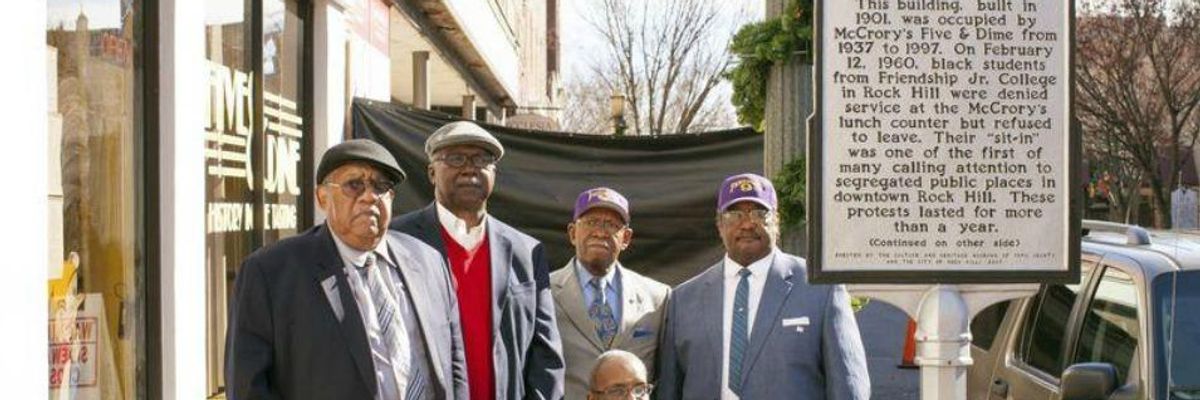More than fifty years after their 'jail, no bail' strategy helped galvanize the fight against racial inequality, serving as a model for other protesters nationwide and spurring larger actions like the March on Washington for Jobs and Freedom in 1963 and the march from Selma to Montgomery in 1965, nine African-American civil rights activists will finally, later this month, have their names cleared.
On the morning of January 31, 1961, a group of African-American demonstrators, most of whom were students at nearby Friendship College, converged on the McCrory's Variety Store in downtown Rock Hill, South Carolina.
Ten young men went inside and sat down at the all-white lunch counter, while others--men and women--stayed outside with picket signs. The 10 activists at the lunch counter ordered hamburgers and soft drinks; they were denied service and asked to leave. When they refused to get up, the men were dragged from the establishment, arrested, taken to the city jail, and tried for trespassing.
According to a narrative at the website of Friendship College (which closed its doors in 1981):
These young men, along with many other Rock Hill demonstrators, had been arrested for trespassing several times during the previous year; each time they paid their bail and were released. But on this occasion in January 1961, they had decided ahead of time that if arrested, they would not accept bail but would serve out their sentences. By so doing they would not only break the cycle of continually paying money into an unfair legal system but also bring attention to the segregated nature of lunch counters and other public places in Rock Hill and elsewhere.
All but one of the men--who was concerned about possibly losing his athletic scholarship at Friendship--refused to allow the NAACP to pay their bail; on February 2, 1961, they began serving out 30-day sentences on the county prison farm.
Next week, 16th Circuit Solicitor Kevin Brackett will convene a special court hearing to have their records exonerated.
According to The Herald of Rock Hill:
Brackett will argue in court that the law in 1961 was unjust, so their convictions were unjust. He will ask that the convictions be vacated.
Circuit Court Judge John C. Hayes III--nephew of the Judge Hayes who convicted the Friendship Nine 54 years ago--will sign the order.
The Friendship Nine finally will have no criminal records.
While the 'Friendship Nine,' as they soon came to be known, served out their sentences, other protesters and supporters converged on the prison--including members of the influential Student Nonviolent Coordinating Committee, who were also arrested, jailed, and then refused bail. Over the course of the next year, further demonstrations and arrests followed in Rock Hill, as well as in other cities throughout the U.S., with protesters across the country adopting the 'jail, no bail' strategy--first utilized by the Nashville Student Movement--rather than helping to subsidize a system that supported segregation and inequality.
On Monday, the city of Rock Hill unveiled new street signs honoring the civil rights activists. The signs declare that Rock Hill has "No Room for Racism" and list the names of the Friendship Nine members: Willie Edward McCleod, James Frank Wells, Clarence Henner Graham, Thomas Walter Gaither, David 'Scoop' Williamson, Robert Lewis McCullough, Mack Cartier Workman, W.T. 'Dub' Massey, and John Alexander Gaines.
On Saturday, three members of the Friendship Nine were grand marshals in the Martin Luther King, Jr. Day parade in York, South Carolina, just a few miles from Rock Hill.
In a speech to the crowd, Willie 'Dub' Massey called on young people and organizers to take proactive steps against racism and injustice: "If you're still acting like somebody owes you something," he said, "you gotta stop that mess and you gotta get it right."
For more on the Friendship Nine and their momentous civil disobedience, watch an excerpt from the 'Jail, No Bail' documentary produced in 2011 by South Carolina ETV:
'Jail, No Bail' Idea Stymied Cities' Profiting From Civil Rights ProtestersRead the transcript: https://to.pbs.org/hMvAHq Fifty years ago, the "Jail, No Bail" strategy became a new tactic in the fight for civil ...
